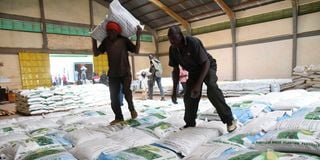Premium
63,000 bags of subsidised fertiliser distributed after farmers redeem their e-vouchers

Workers offload bags of fertiliser at the National Cereals and Produce Board depot in Eldoret, Uasin Gishu County. The government has distributed 63,270 bags of fertiliser worth Sh231.1 million under the e-voucher system arrangement.
The government has distributed 63,270 bags of fertiliser worth Sh231.1 million under the e-voucher system arrangement, as farmers rush to purchase the inputs for this season's planting, the latest update on the Subsidised Fertiliser Program (SFP) shows.
The February update from the Ministry of Agriculture and the Office of the State House Spokesperson indicates that 4,949 out of the 1.08 million maize farmers in the government registration platform have so redeemed their vouchers and benefitted from the subsidised fertiliser.
The farm input is being sold at Sh3,500, down from Sh6,500 at National Cereals and Produce Board (NCPB) or Kenya National Trading Corporation (KNTC) stores. More than 836,000 vouchers were issued to maize farmers in 10 counties to benefit from the e-voucher scheme.
This is how the payment process works: The system generates an e-voucher, then the farmer takes the voucher to an NCPB or KNTC store. The store attendant validates the voucher, the farmer pays for the fertiliser, and the attendant hands over the fertiliser to the farmer.
Government records put at 4.2 million the number of registered farmers nationally for all crops, who are set to benefit from the distribution of subsidised fertiliser.
The board has extended the duration in which farmers can collect the fertiliser, from 7 to 30 days, and put in place measures to lock out cartels from the scheme.
“Farmers now have up to 30 days to collect the fertiliser under the electronic voucher subsidy programme, after receiving an SMS notification,” said Joseph Kimote, NCPB Managing Director in Kitale. The period was increased from the initial seven days, after farmers protested.
The SFP report dated February 10 shows that the government has made available 6 million bags (50kg) of planting fertiliser and an additional 4 million (50kg) bags of top-dressing fertiliser to increase crop productivity.
It has, however, scaled down the supply of Di-Ammonium Phosphate (DAP) to contain soil acidity, which has been blamed for the decline in crop yield. This fertiliser, popular among many farmers, is missing in NCPB outlets.
Many farmers have ignored advice by the Ministry of Agriculture to stop the continuous use of DAP, blamed for declined maize production.
“Unlike in the past, we do not have stocks of DAP, but there are other varieties NPK 23; 23 that are equally suitable for maize planting,” said Gilbert Rotich, the NCPB Regional Manager in charge of the North Rift.
National Accepted Agriculture Input Access (NAAIA), in collaboration with the Kenya Agricultural and Livestock Research Organization (KALRO), have discouraged the application of DAP fertiliser in maize growing zones of Uasin Gishu, Trans-Nzoia, Nandi, and Elgeyo Marakwet counties.
The soil acidity level (PH) in the region ranges from 5 to 7 and farmers have been advised to apply compost or animal manure during planting to regulate the fertility to the required range.
They need to apply Calcium Ammonium Phosphate (CAN) for top dressing to improve crop production.
A study by the Kenya Agriculture and Livestock Research Organization (KALRO) indicates that farmers in Uasin Gishu and Trans-Nzoia counties lose an average of 10 bags of maize per harvest due to declined soil fertility caused by continuous application of the common type of fertiliser.
The declined crop production is confirmed by an earlier agriculture report on fertiliser that indicates that maize production in the region has dropped from 30 to 20 bags as soil continues to lose its fertility.
It costs farmers between Sh1,500 and Sh2,000 to carry out sampling to determine the acidity level of their soil.
The Kenya Plant Health and Inspectorate Service (KEPHIS) and Kenya Agricultural Research Institute (KARI) are among the agricultural institutions that carry out soil analysis.
Maize production in Uasin Gishu, a major growing zone, dropped from 4.4 million to 3.7 million bags in 2021, while the yield in Trans-Nzoia declined from 5.3 million bags to 4.7 million bags.
“I could harvest an average of 30 bags per acre then, but I can hardly manage 20 bags now. Soil fertility has continued to go down, while we cannot access information on modern crop production techniques from government agriculture officials as was the case before,” said Hellen Kirarei, a farmer from Cheptiret in Uasin Gishu County.
According to agricultural experts, crop production in Africa has declined from 2 to 5 percent in the past 10 years as a result of land degradation.





